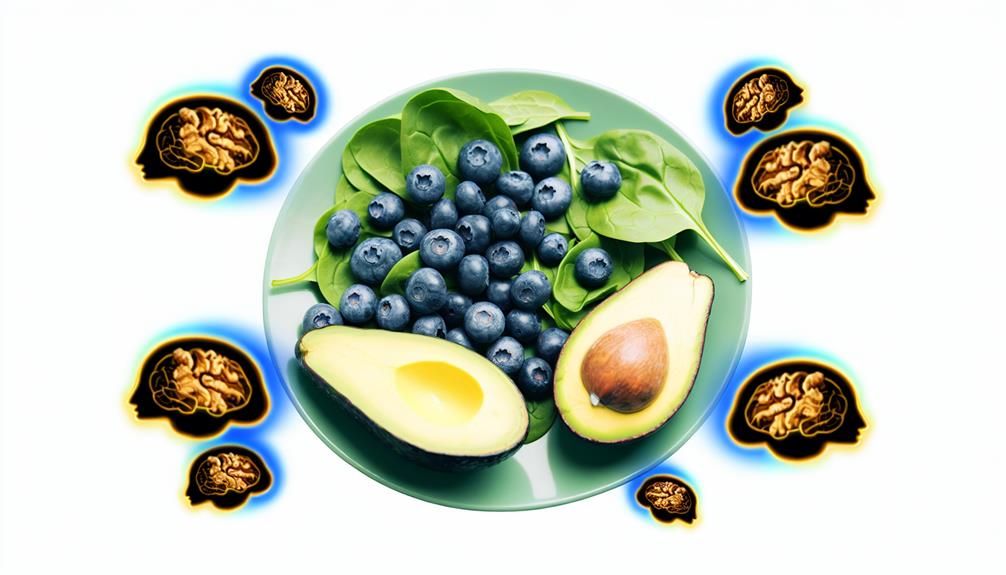
Enhance your memory with essential nutrients for memory improvement. Omega-3 fatty acids support cognitive function and memory. Antioxidants protect brain cells from damage. Vitamin B12 aids brain health and cognitive function. Vitamin D boosts brain health and memory recall. Magnesium positively impacts cognitive function. Zinc is vital for memory enhancement. Iron is crucial for cognitive function. Vitamin E protects brain cells. Vitamin C is crucial for brain function. Phosphatidylserine supports memory improvement. Incorporate these nutrients into your diet for optimal memory.
Key Takeaways
- Omega-3 fatty acids support cognitive function and memory.
- Antioxidants protect brain cells from oxidative damage.
- Vitamin B12 aids cognitive function and brain health.
- Vitamin D enhances memory recall and cognitive function.
- Magnesium positively impacts cognitive function and memory.
Omega-3 Fatty Acids
To boost your memory and cognitive function, incorporating Omega-3 fatty acids into your diet is a scientifically supported approach. Omega-3 benefits are well-documented, with studies showing that these essential fatty acids play a crucial role in cognitive performance. DHA, a type of Omega-3, is a major structural component of the brain and is vital for optimal brain function. EPA, another Omega-3 fatty acid, has anti-inflammatory effects that can help protect brain cells from damage and support overall brain health.
Research suggests that Omega-3 fatty acids can improve memory, attention, and problem-solving skills. These nutrients are believed to enhance communication between brain cells, promote neuroplasticity, and reduce oxidative stress in the brain. Including food sources rich in Omega-3, such as fatty fish, flaxseeds, and walnuts, in your diet can have a positive impact on your cognitive abilities.
Incorporating Omega-3 fatty acids into your meals regularly can be a simple yet effective way to support your brain health and cognitive function.
Antioxidants
Antioxidants are essential compounds that play a crucial role in protecting your cells from oxidative damage. Free radical protection is one of the key functions of antioxidants, helping to prevent cellular damage that can impact memory retention. By neutralizing these free radicals, antioxidants contribute to cognitive longevity and promote mental acuity.
Various antioxidants such as vitamin C, vitamin E, and beta-carotene can be found in a range of foods like fruits, vegetables, nuts, and seeds. These antioxidants work synergistically to combat oxidative stress in the body, which is known to have detrimental effects on brain health and memory function.

Including antioxidant-rich foods in your diet can be beneficial not only for your overall health but specifically for your brain function. Research suggests that a diet high in antioxidants may help protect against cognitive decline and support optimal brain performance. Therefore, incorporating these powerful compounds into your daily meals can contribute to improved memory retention and cognitive function over time.
Vitamin B12
Vitamin B12 plays a crucial role in brain health, aiding in cognitive function and memory.
To ensure you're getting enough B12, include foods like salmon, eggs, and fortified cereals in your diet.
Maintaining adequate levels of Vitamin B12 is essential for optimal brain function and memory retention.
Brain Health Benefits
Consuming adequate amounts of Vitamin B12 is vital for maintaining optimal brain health and function. Vitamin B12 plays a crucial role in cognitive performance and overall brain function. This essential nutrient is involved in the production of neurotransmitters that are responsible for transmitting signals within the brain.
A deficiency in Vitamin B12 can lead to cognitive decline, memory problems, and difficulty concentrating. Ensuring an adequate intake of Vitamin B12 through supplementation or fortified foods can support brain health and potentially improve cognitive abilities.

It's important to monitor Vitamin B12 levels, especially in older adults and vegetarians, as they're at a higher risk of deficiency. Prioritizing Vitamin B12 intake can contribute to better brain health and overall cognitive function.
Food Sources of B12
To maintain optimal brain health and function, it's important to be aware of the various food sources rich in Vitamin B12. Vitamin B12 plays a crucial role in memory improvement. Incorporating B12-rich foods into your diet is essential for cognitive function.
Here are some B12-rich foods and vegetarian options to consider:
- Meat: Beef, liver, and chicken provide high levels of Vitamin B12.
- Seafood: Fish such as salmon, trout, and tuna are excellent sources of B12.
- Dairy and Eggs: Milk, yogurt, cheese, and eggs are good options for vegetarians to meet their B12 needs.
Including these foods in your diet can help ensure you maintain adequate levels of Vitamin B12 for optimal brain health and memory function.
Vitamin D
Boosting your intake of this essential nutrient can have a significant impact on cognitive function and memory performance. Vitamin D, often referred to as the “sunshine vitamin,” plays a crucial role in brain health. Adequate levels of Vitamin D have been associated with improved cognitive function and a reduced risk of cognitive decline.
| Benefits of Vitamin D | Sources | Recommended Daily Intake |
|---|---|---|
| Supports brain health | Sun exposure, fatty fish, fortified dairy products | 600-800 IU for adults |
| Enhances memory recall | Supplements, egg yolks, mushrooms | Varies based on age |
| Regulates neurotransmitters | Fortified cereals, beef liver, cod liver oil | Consult a healthcare provider |
| Mood regulation | Orange juice, soy milk, sardines |
Ensuring you get enough Vitamin D through sunlight, diet, or supplements is crucial for overall cognitive function and memory enhancement. Remember to consult with a healthcare provider to determine the appropriate intake for your individual needs.

Magnesium
Increasing your intake of Magnesium can positively impact cognitive function and memory retention. Magnesium is an essential mineral that plays a crucial role in various brain functions. Here are some key points to consider when incorporating magnesium into your diet:
- Magnesium supplements: Taking magnesium supplements can be an effective way to ensure you're meeting your daily magnesium needs, especially if you have a magnesium deficiency or struggle to get enough through food alone.
- Magnesium rich foods: Including magnesium-rich foods in your diet is vital for cognitive health. Foods such as leafy greens (spinach, kale), nuts and seeds (almonds, pumpkin seeds), whole grains (brown rice, quinoa), and legumes (black beans, chickpeas) are excellent sources of magnesium.
- Balanced intake: It's essential to maintain a balanced intake of magnesium through a combination of supplements and dietary sources to support optimal brain function and memory retention.
Zinc
Consuming foods rich in zinc is essential for supporting cognitive function and memory enhancement. Zinc is a vital mineral that plays a crucial role in various physiological processes, including synaptic signaling and neurotransmitter function in the brain. Research suggests that zinc supplementation can lead to notable memory benefits, making it a promising nutrient for those looking to enhance their cognitive abilities.
Zinc is involved in the regulation of communication between neurons, which is essential for processes such as learning and memory formation. Studies have shown that adequate levels of zinc in the body can improve memory, enhance cognitive performance, and support overall brain health. Zinc supplementation has been linked to better memory recall, particularly in tasks that require attention and concentration.
Incorporating zinc-rich foods like oysters, beef, pumpkin seeds, and chickpeas into your diet can help ensure you're meeting your daily requirements of this important mineral. However, if needed, zinc supplementation under the guidance of a healthcare provider may also offer additional memory benefits.
Iron
To maintain optimal cognitive function and memory enhancement, considering the significance of zinc, transitioning to the discussion of iron is pertinent as it also plays a crucial role in supporting brain health and overall cognitive abilities. Iron is an essential mineral that's involved in cognitive processes and brain function.
Here are some key points about iron:

- Dietary sources:
- Red meat, poultry, and seafood are rich sources of heme iron, which is more easily absorbed by the body.
- Plant-based sources like lentils, beans, and fortified cereals provide non-heme iron, which is less readily absorbed but can still contribute to overall iron intake.
- Combining iron-rich foods with sources of vitamin C can enhance iron absorption.
Iron absorption rate varies depending on the type of iron consumed and individual factors such as age and overall iron status. Ensuring an adequate intake of iron as a key nutrient for memory improvement, within a balanced diet is crucial for maintaining cognitive function and supporting memory enhancement.
Vitamin E
Vitamin E, an essential nutrient for brain health and cognitive function, plays a crucial role in supporting memory enhancement and overall mental well-being. Research studies have highlighted various benefits of Vitamin E in memory improvement. Vitamin E is known for its antioxidant properties that help in protecting brain cells from oxidative stress, which can contribute to cognitive decline.
Studies have shown that Vitamin E supplements may help in slowing down age-related cognitive decline and reducing the risk of developing conditions like Alzheimer's disease. This nutrient is involved in maintaining healthy neuronal membranes and supporting neurotransmitter function, both of which are essential for optimal brain performance and memory formation.
Including Vitamin E-rich foods such as almonds, sunflower seeds, spinach, and avocados in your diet can be beneficial for cognitive health. However, before considering Vitamin E supplements for memory enhancement, it's advisable to consult with a healthcare provider to determine the appropriate dosage and ensure it fits your individual needs.
Vitamin C
Vitamin C plays a crucial role in maintaining healthy brain function and memory due to its powerful antioxidant properties. By protecting the brain from oxidative stress, Vitamin C supports cognitive function and may help enhance memory retention.
Including Vitamin C-rich foods in your diet can potentially contribute to improved memory and overall brain health.

Antioxidant Benefits of Vitamin C
Consuming foods rich in vitamin C can significantly boost your body's antioxidant defenses. Vitamin C acts as a powerful antioxidant, protecting cells from damage caused by free radicals. This nutrient plays a crucial role in supporting your overall health and well-being.
Here are some key benefits of vitamin C:
- Immune System Boost: Vitamin C enhances the function of various immune cells, helping your body fight off infections more effectively.
- Collagen Production: Vitamin C is essential for collagen synthesis, which is vital for maintaining healthy skin, bones, and connective tissues.
- Free Radical Scavenging: Vitamin C scavenges free radicals, reducing oxidative stress and lowering the risk of chronic diseases.
Make sure to include vitamin C-rich foods in your diet to reap these antioxidant benefits.
Cognitive Function Support
To support cognitive function effectively, incorporating vitamin C-rich foods into your daily diet is essential. Vitamin C is a powerful antioxidant that plays a crucial role in brain health and cognitive function. It aids in protecting the brain from free radical damage, which can contribute to cognitive decline.
Research suggests that vitamin C may help in cognitive enhancement techniques and memory improvement strategies. Including foods such as oranges, strawberries, bell peppers, and broccoli in your diet can provide you with a good dose of vitamin C. Alongside brain health exercises and mental agility tips, ensuring an adequate intake of vitamin C through your diet can be beneficial for supporting overall cognitive function and maintaining a healthy brain.
Nutrients for Memory Improvement and Memory Enhancement Properties
Including vitamin C-rich foods in your daily diet can significantly contribute to enhancing memory function and cognitive performance. Vitamin C is a powerful antioxidant that plays a crucial role in brain health and memory enhancement. Here are some ways in which vitamin C can benefit your memory:

- Protection against oxidative stress: Vitamin C helps protect brain cells from damage caused by free radicals, thus supporting cognitive function.
- Neurotransmitter synthesis: This nutrient is involved in the production of neurotransmitters, which are essential for communication between brain cells.
- Improved focus and attention: By supporting overall brain health, vitamin C can help enhance focus and attention during cognitive exercises and brain training.
In addition to incorporating vitamin C into your diet, consider exploring herbal supplements and memory herbs for further memory enhancement support.
Phosphatidylserine
Phosphatidylserine plays a crucial role in supporting cognitive function and memory improvement. This phospholipid is naturally found in high concentrations in the brain and is involved in various essential functions. Research has shown that phosphatidylserine benefits extend to cognitive enhancement properties. By aiding in the maintenance of cellular function, this compound helps support communication between brain cells, thus enhancing memory, focus, and overall cognitive performance.
Studies suggest that phosphatidylserine supplementation may be particularly beneficial for individuals experiencing age-related cognitive decline or memory issues. By promoting healthy brain cell membranes and optimizing neurotransmitter activity, phosphatidylserine contributes to improved cognitive function. Furthermore, this nutrient has been linked to reduced levels of cortisol, a hormone associated with stress, thereby potentially supporting better cognitive resilience under challenging conditions.
Incorporating phosphatidylserine into your daily routine, whether through diet or supplements, may offer significant cognitive benefits. Remember to consult with a healthcare provider before starting any new supplementation regimen, especially if you have existing health conditions or are taking medications.
Conclusion
So, now that you know all about the nutrients for memory improvement that can help improve your cognitive function, go ahead and stock up on those brain-boosting foods!
Remember, your brain is like a sponge that needs the right nutrients to soak up all that knowledge.

Don't let your memory fade away like a forgotten grocery list – feed it the nutrients it craves and watch your memory power soar to new heights!




